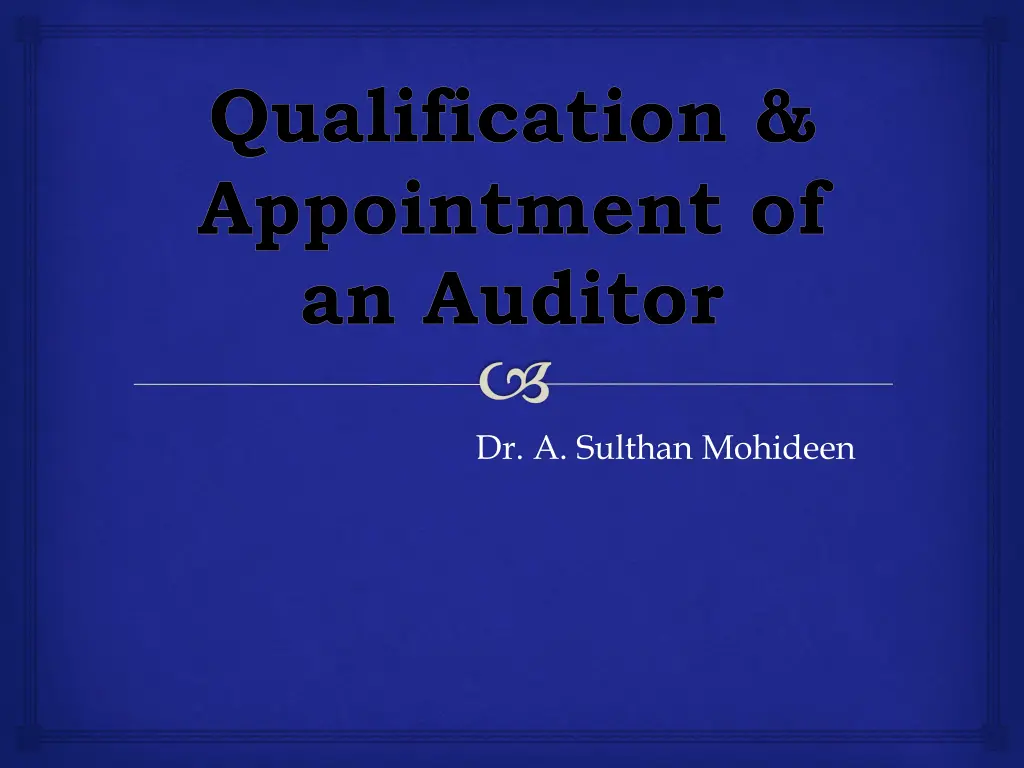
Appointment and Qualification of an Auditor According to Companies Act
Learn about the qualification and appointment process of auditors, including competence, independence, and confidentiality requirements. Get insights into the roles and responsibilities of auditors as outlined in the Companies Act of India.
Download Presentation

Please find below an Image/Link to download the presentation.
The content on the website is provided AS IS for your information and personal use only. It may not be sold, licensed, or shared on other websites without obtaining consent from the author. If you encounter any issues during the download, it is possible that the publisher has removed the file from their server.
You are allowed to download the files provided on this website for personal or commercial use, subject to the condition that they are used lawfully. All files are the property of their respective owners.
The content on the website is provided AS IS for your information and personal use only. It may not be sold, licensed, or shared on other websites without obtaining consent from the author.
E N D
Presentation Transcript
Qualification & Appointment of an Auditor Dr. A. Sulthan Mohideen
Competence Independence Confidentiality Qualification of an Auditor
Competence In India, Chartered Accountants are competent auditors. A Chartered Accountant is a person who is a member of the Institute of Chartered Accountants of India. To become the member of the Institute, one must undergo practical training and pass the prescribed examination stipulated in the Chartered Accountants Act and Chartered Accountants Regulations.
Independence Independence implies acting without any fear or favors. In order to protect the independence of the auditors, following provisions are enacted in companies act. For example Section 226 (2) of Companies Act lays down that the following persons cannot be appointed as auditor of a company even though they are otherwise qualified: (a) An officer or employee of the company. (b) A person who is partner or who is in the employment of an employee of the company. (c) A person who is indebted to the company for an amount exceeding Rs 1000.
Confidentiality An auditor should keep the information concerning his clients confidentially. He should not disclose these to others unless there is legal or professional duty to divulge information. This is an essential quality of an auditor.
Appointment of Auditor Section 224(5) provides for the appointment of first auditors by the Board of Directors within one month after the date of registration of the company. First Auditors Subsequent auditor or auditors of a company are appointed every year by the shareholders in annual general meeting by passing an ordinary resolution Subsequent Auditors According to Section 224(3), where at an annual general meeting no auditors are appointed or re-appointed, the Central Government may appoint a person to fill the vacancy. Appointment by Central Government Appointment against a Casual Vacancy If due to death, insanity, insolvency or other disqualification a casual vacancy of the auditor arises, the Board of Directors can fill the same under Section 224 (6). The vacancy arising out of resignation of the auditor or his refusal to accept the appointment is not a casual vacancy. The Board has no power to fill such vacancy, Appointment by Central Government According to Section 224(3), where at an annual general meeting no auditors are appointed or re-appointed, the Central Government may appoint a person to fill the vacancy. Appointment of Auditors of Government or certain other Companies The provisions regarding appointment of Government Companies are different. Section 619 provides that the auditor of a Government Company shall be appointed or re-appointed by the Comptroller and Auditor General of India Appointment by Special Resolution The Companies Act, 1974, introduced Sec. 224-A which provides that in the case of company in which 25% or more of the subscribed share capital is held, whether singly or in any combination .
First Auditors Section 224(5) provides for the appointment of first auditors by the Board of Directors within one month after the date of registration of the company. The auditor or auditors so appointed shall hold office until the conclusion of the first annual general meeting. The company may, however, at a general meeting, remove any such auditors and appoint in their place any other person who has been nominated for appointment by any member of the company and of whose nomination notice has been given to the members of the company not less than 14 days before the date of meeting. If the Board of Directors fails to exercise its power, the company in general meeting may appoint the first auditor or auditors.
Subsequent Auditors Subsequent auditor or auditors of a company are appointed every year by the shareholders in annual general meeting by passing an ordinary resolution. According to Section 224 (1), "every company shall, at each annual general meeting, appoint an auditor or auditors to hold office from the conclusion of that meeting until the conclusion of the next annual general meeting, and shall, within 7 days of the appointment, give intimation thereof to every auditor so appointed." Section 224 (I-A) requires the auditor(s) so appointed to communicate his acceptance or refusal to the Registrar within the period of 30 days of the receipt from the company of the intimation of his appointment on the prescribed form. If the auditor so appointed does not accept the appointment, the Board of Directors is not permitted to appoint an auditor. Therefore, another general meeting has to be convened to appoint new auditor(s).
Appointment against a Casual Vacancy If due to death, insanity, insolvency or other disqualification a casual vacancy of the auditor arises, the Board of Directors can fill the same under Section 224 (6). The auditor appointed against such a vacancy will hold office till the conclusion of next annual general meeting. The vacancy arising out of resignation of the auditor or his refusal to accept the appointment is not a casual vacancy. The Board has no power to fill such vacancy, even if the shareholders' have authorized it in this behalf. Such a vacancy should be filled by the shareholders ' in general body meeting.
Appointment by Central Government According to Section 224(3), where at an annual general meeting no auditors are appointed or re- appointed, the Central Government may appoint a person to fill the vacancy. Within 7 days of the power of the Central Government becoming exercisable, company shall give notice of the fact to the Regional Director, to whom the Central Government s power to appoint an auditor in such an event has been delegated under section 637
Generally accepted Auditing Practice What is "generally accepted auditing standards" cannot be easily defined. Yet it is important to have understanding of what the term may connote. It implies, among other things, the following: a) Only competent and independent person carries out the audit b) In performing audit the work is well-planned and supervised.
Appointment by Special Resolution The Companies Act, introduced Sec. 224-A which provides that in the case of company in which 25% or more of the subscribed share capital is held, whether singly or in any combination by: (a) A public financial institution or a Government Company or any State Govt., or (b) any financial or other institution established by any provincial or State Act in which a State Government holds not less than 51% of the subscribed share capital or ; (c) a nationalized bank or an insurance company carrying on general insurance business ; (d) or any combination of the above categories. The appointment of an auditor or auditors shall be made by a special resolution.
Appointment of Auditors of Government The provisions regarding appointment of Government Companies are different. Section 619 provides that the auditor of a Government Company shall be appointed or re-appointed by the Comptroller and Auditor General of India. He may also conduct a supplementary or test audit of such company's accounts by persons authorized by him in this behalf. The auditor should submit a copy of his audit report to the Comptroller and Auditor General of India who has, the right to comment on or supplement, the audit report
GenerallyAccepted Auditing Practice What is "generally accepted auditing standards" cannot be easily defined. Yet it is important to have understanding of what the term may connote. It implies, among other things, the following: a) Only competent and independent person carries out the audit b) In performing audit the work is well-planned and supervised.
Generally accepted Auditing Practice c) Sufficient and appropriate audit evidences are gathered and tested before an opinion is framed d) Proper judgement is made of financial statements under audit in the light of professional knowledge of auditor concerning generally accepted accounting practices, special enactments affecting the financial statements, pronouncements of professional bodies having bearing on them.












